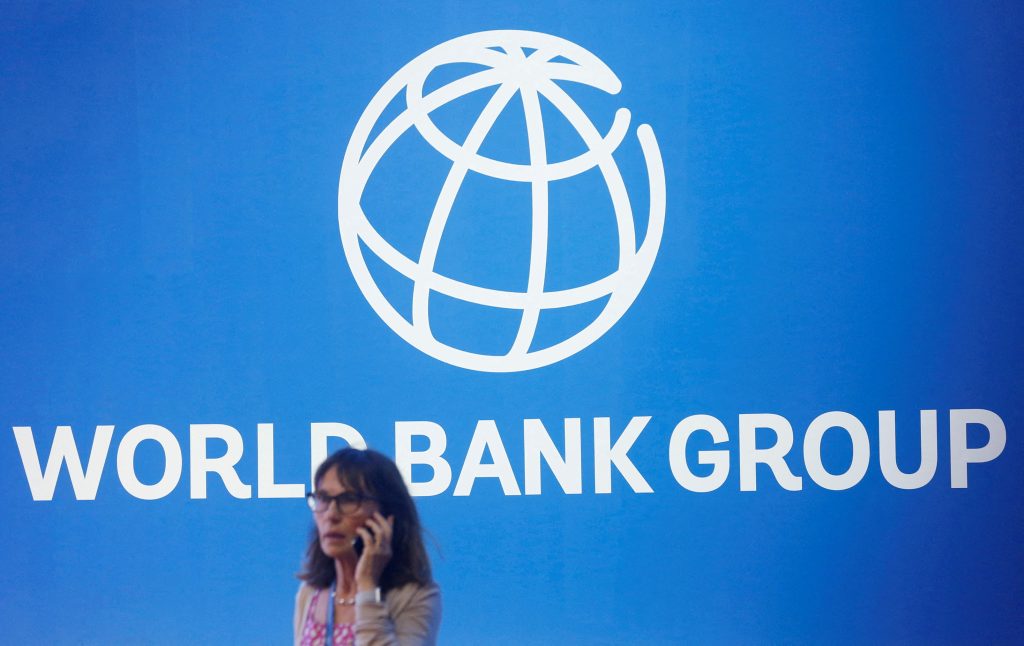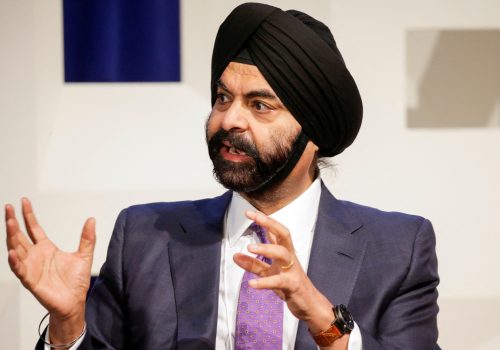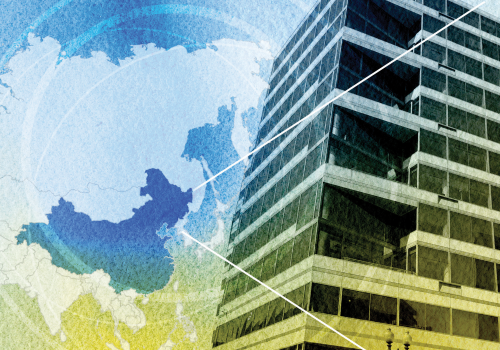The World Bank is about to enter a moment of significant transition. Former Mastercard Chief Executive Officer Ajay Banga is the sole candidate to be the organization’s next president, with the nomination window now closed, and he could take the helm as soon as early May. He arrives at a time of growing enthusiasm within the United States and other Group of Twenty (G20) nations for reform of international financial institutions and also a moment of significant economic upheaval.
The compounding crises of COVID-19, the war in Ukraine, persistent inflation, and climate change have battered the global economy. Meanwhile, debt, digital, and demographic disruptions are reorganizing the needs for and nature of development investments. To deliver on its mission to “end extreme poverty and promote shared prosperity in a sustainable way,” the World Bank should seize this moment and redefine its role in the global economy. It can start by focusing on these five policy priorities to help address the challenges to inclusive growth in the global economy today.
1. Address the uptick in extreme poverty due to COVID, conflict, and climate
COVID-19 ended the decline in global poverty dating back to 1998. More than seventy million people were pushed into extreme poverty in 2020. By its own admission, the World Bank will no longer be able to achieve its goal of reducing extreme poverty (currently around 9 percent of the world’s population) to 3 percent by 2030. Slow vaccine rollout in poorer economies has prolonged COVID’s impact. Since the start of the pandemic, inequality within and between countries has grown; young people and women disproportionately have carried the costs of these crises.
Russia’s full-scale invasion of Ukraine in 2022 sent global prices of food, fuel, and fertilizer skyrocketing. The World Food Programme estimated that 345 million people will face acute food insecurity in 2023, double the amount of 2020. Meanwhile the climate crisis and weather-related events continue to undercut infrastructure, impact agriculture production, and intensify humanitarian disasters that displace millions globally. The World Bank should devote as much as possible of its lending and advisory might to social protection and tackling the immediate shortfalls in food, energy, and raw materials that are driving higher inflation and exacerbating poverty. At the same time, it should work to support longer-term recovery and resilience, including through data, infrastructure, governance, and economic reform.
2. Deal with debt distress
Throughout the 2010s, countries increased external borrowing in a long period of low interest rates and high liquidity and then accumulated even more debt in response to the pandemic. Now as financial conditions tighten, questions over the sustainability of this debt are rising. Fifty-four countries are already in debt crises. The private sector has fared no better; looming corporate debt distress poses systemic risks. A growing problem of non-performing loans and the recent banking sector crisis will likely lead to a credit crunch, disproportionately hampering lending to small- and medium-sized enterprises that dominate emerging market and developing economies.
While the International Monetary Fund is on the front line of financial crises, it is up to the World Bank to keep developing countries focused on projects and reforms that support long-term economic growth prospects. When key projects are at risk of being canceled or deferred, the World Bank should engage with all stakeholders, from creditors and ratings agencies to domestic policymakers, to isolate these from cuts. The World Bank has the resources to do this, for example, through its Development Policy Financing tools. But it should redouble efforts and consider raising more money on markets to lend into debt-distressed countries and companies (especially small businesses) and to restructure existing debts.
3. Embrace the digital revolution
Commerce, public administration, and education are all evolving with rapid digitization. As technology becomes part of most jobs or business processes and creates entirely new ones, the World Bank should prioritize projects providing new and accessible ways to upskill youth and reskill older workers who are not digital natives, as well as technologies that make physical activities easier to perform. The World Bank has already taken encouraging steps in this direction, such as Skilling Up Mashreq and other programs. The World Bank should also provide support for innovation and entrepreneurship across government, education, health care, finance, green energy, and agriculture to increase digital and technology integration at the sector level. It should further develop infrastructures, policy frameworks, and regulatory reform that improves the availability, access, and affordability of new technologies. That should include incentivizing public-private partnerships and directly engaging with the private sector.
4. Change incentive structures for private capital
Interest rates have been hiked in response to high inflation, raising borrowing costs for governments and the private sector. At the same time, higher interest rates in developed markets mean higher rates of return, which, combined with increased risk in lower- and middle-income countries, could lure emerging-market investors to the United States and Europe. In order to maintain the flow of investment into projects in emerging economies, it is crucial for investment contracts to be well thought through, with protections against inflation. The World Bank’s lending for a project, even when small, will continue to play a key role in reassuring investors and “crowding in” funding and financing—including climate finance for adaptation and mitigation.
5. Reestablish that inclusive growth begins with inclusive governance
The Group of Seven (G7) and European Union member states together control more than 50 percent of all votes at the World Bank, even as they represent under 13 percent of the global population. As part of its overall reforms, the World Bank should seriously consider voting reforms to address criticism from its members of unequal voice and representation. The organization should increase coordination with regional development banks, which are more sensitive to the dynamics of their operating regions and have demonstrated their capacities in helping respond to the pandemic and to climate change. It should deepen engagement with sovereign wealth funds, multinational corporations, and pension funds, which play a far greater role in the global economy than they did in 1944, when the Bretton Woods Institutions were created. At the same time, operationally, the World Bank should re-double its consultation with and support to young people, women, and small- and medium-sized enterprises—each has seen substantial pre-COVID gains erased. This support can include helping them tap into recovery initiatives and opportunities in the expanding green, social, and industrial sectors.
The challenges facing the World Bank are daunting. But the appointment of a new president and an appetite for reform in the United States and elsewhere mean that the World Bank has a unique opportunity to anticipate changes to its mandate and prepare for a stronger future.
Nicole Goldin is a nonresident senior fellow at the GeoEconomics Center and global head of inclusive economic growth at Abt Associates, a consulting and research firm.
Mrugank Bhusari is an assistant director at the Atlantic Council GeoEconomics Center.
Further reading
Thu, Feb 23, 2023
The big questions (and answers) about Ajay Banga’s nomination to lead the World Bank
New Atlanticist By
What to know about the former Mastercard chief executive officer's surprise nomination to lead the World Bank.
Mon, Oct 17, 2022
How China would like to reshape international economic institutions
Report By
Despite its size, China has an inadequate voice in traditional Bretton Woods Institutions. This paper examines aspects of the dissatisfaction China has with existing global governance institutions such as the World Trade Organization (WTO) and the International Monetary Fund (IMF). It also discusses the proposed changes to these institutions according to discussions with Chinese experts.
Mon, Oct 17, 2022
Modernizing the Bretton Woods Institutions for the twenty-first century
Report By Ajay Chhibber
The challenges that led to World War II have resurfaced and created the dire need for reform of the Bretton Woods Institutions. A new system to address these challenges requires the three core "Rs"—a revised global remit, an enhanced resource base, and a mandate to monitor agreed-upon global rules.
Image: A participant stands near a logo of World Bank at the International Monetary Fund - World Bank Annual Meeting 2018 in Nusa Dua, Bali, Indonesia, October 12, 2018.



